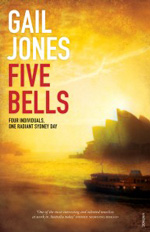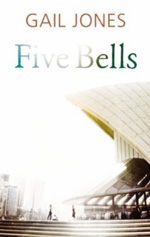


Vintage Australia, paperback, 9781864710601
Harvill Secker, hardcover, 9781846554025
Five Bells is as luminous as the glorious Sydney day on which this story unfolds:
Circular Quay, Sydney, is the bus and train terminus for Sydney Harbour. The Quay is also where the ferries dock and is a busy place with its people, shops and buskers. From the Quay one can walk the concourse, filled with cafes and restaurants, to the Sydney Opera House. And of course the Harbour Bridge forms part of the scenery. Five Bells is set on a sunny Saturday, when four individuals travel, separately, to the Quay.
Ellie and James, once young lovers, and long estranged, have arranged to meet. As Ellie prepares for their rendezvous her mind is preoccupied with memories of James and of their school days together. Miss Morrison, their seventh grade teacher, is present in her thoughts, especially the teacher's explanation of a clepsydra, a Chinese water clock. James reminisces about his awkwardness as a school student and about his mentally-ill mother. At one time enrolled in Medicine, James yearned for a different life, wanting to be an artist like Magritte but having no aptitude in that direction. Although James later found contentment as a school teacher, a recent event has traumatised him and left him at the mercy of valium and alcohol.
Pei-Xing has been living in Australia for about ten years. She is a survivor of the Cultural Revolution in China, having been incarcerated for several years. On this Saturday, as she goes to visit a friend, Pei-Xing ponders the life of her father, who translated Pasternak's Dr Zhivago from Russian into Chinese. And she fondly recalls her time as an English teacher.
Catherine is Irish, and has been in Sydney for only two weeks. Once she dreamed of travelling with her brother Brendan but he is now dead. During the day Catherine muses over their family history and some of Dublin's sad story. She also thinks hard about her relationship with Luc, a translator.
Jones's novel takes its title from a famous Australian poem by Kenneth Slessor, about the drowning of his friend Joe Lynch in Sydney Harbour. Slessor writes: "You have gone from earth, gone even from the meaning of a name, yet something's there." And Jones takes this concept of the dead living on in people's memories and applies it carefully, beautifully, through her characters. In fact Five Bells is pretty much an homage to Slessor's poem, borrowing the location, references to water and time, and even referring to his "verticals of light [ferrying] the moonshine down." Ellie's recollection of the clepsydra reinforces the thematic material of Five Bells: Clepsydra involved vessels that dripped or leaked, flowed or seeped, making use of floating pointers or measures. It was a process of emptying and filling, a fluent time-passing; not one chopped into bits and pieces. In the same way, infers Jones, the moment of death does not mean the dissolution of a person if that person exists in the minds of others.
Jones has created an accurate and evocative picture of Sydney bathed in sunshine. Each character's story has charm and interest. Moreover, Five Bells realises the multi-racial aspect of Sydney. That one of the main characters is Chinese is particularly important. There have been Chinese-Australians since the early years of the colony and by placing Pei-Xing in the foreground Jones acknowledges this integral part of Australian culture. And Jones includes Hungarians, Arabs and Turks, among others, as part of Sydney's population.
I could write so much more about this lovely novel but I hope that you will discover it for yourself. As usual,
Jones's prose is perfection.
